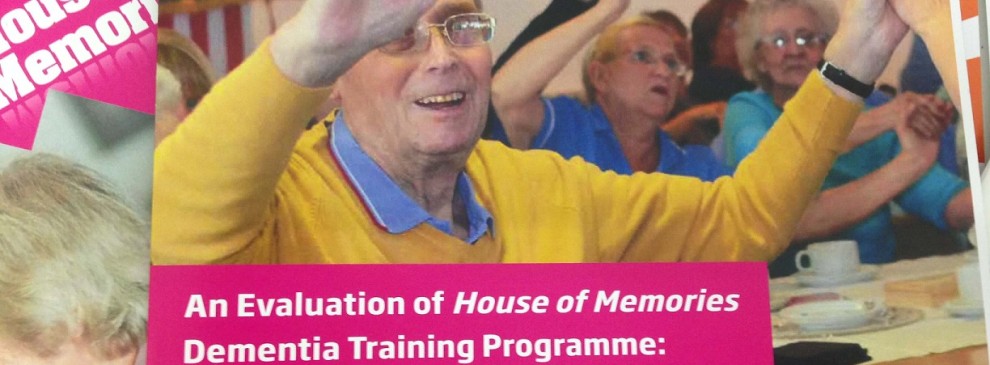Evaluation of House of Memories in the Midlands 2014
Following the successful delivery of the House of Memories Northern Model during February-March 2013, NML received funding from the Department of Health to deliver a new House of Memories programme in the Midlands during March 2014, in collaboration with the following partners: Birmingham Museum and Gallery, 11 & 12 March; Leicester Guildhall, 18 & 19 March; and Wollaton Hall, Nottingham, 24 & 25 March. The ICC was thrilled to be commissioned to evaluate this important museums-led dementia care training initiative for a second time, as it gains national significance through its regional programme.
Key learning outcomes and ‘impact indicators’ from previous House of Memories evaluation studies include:
- Increased awareness and understanding of dementia
- Skills development including listening, communication and empathy
- Improved capacity for [individual and collective] critical, reflective care practice
- Confidence in trying new approaches to dementia care
- Improved knowledge, skills and access in relation to memory activities
- Appreciation of creative and interactive training approach
- Enhanced appreciation of the relevance and value of museums in dementia care
Led by Kerry Wilson (Head of Research) and Gayle Whelan (Research Fellow), the specific aims and objectives of the Midlands evaluation were to further test these established indicators via a standardised House of Memories Impact Measure and methodological framework that captured:
- The impact on participants’ own sense of wellbeing as dementia carers
- The impact upon participants’ values, behaviours and skills as dementia carers
- The wider impact within the Midlands with respect to the creation of dementia friendly communities
- The contribution of House of Memories in the Midlands to the National Dementia Care strategy
The research was completed in two iterative stages, designed to inform the development of a reliable, adaptable evaluation framework. The first phase involved the design and testing of the Dementia Care Impact Measure, which assessed the impact of House of Memories on participants’ subjective wellbeing in a dementia care context, and relative impact upon participants’ values, behaviours and skills as dementia carers (mapped against the National Dementia Strategy). During the second phase, key stakeholders from across the three participating venues were invited to participate in a social return on investment (SROI) workshop. Social value indicators identified during phase 1 (and consistent with previous evaluation studies) informed analysis of the ‘cost benefit’ of House of Memories to NML and the Midlands region.
The evaluation of House of Memories in the Midlands provides significant evidence on the impact of the programme on the personal wellbeing of individual participating dementia carers (intrinsic value), and their subsequent professional development, via the standardised Dementia Care Impact Measure. Positive outcomes include enhanced optimism, confidence and compassion as dementia carers; advanced knowledge of dementia and of own contribution to improving care standards; renewed commitment to training and development; reducing the stigma of dementia and improving dementia care environments across the full sample of 72 participating dementia carers. The summary evaluation report published by NML is available here.
Qualitative SROI analysis, following a workshop with 8 key stakeholders, substantiated and validated these findings, pointing to considerable instrumental value for the dementia care sector. Outcomes were grouped according to three themes including dementia awareness; improved care standards; and professional development.
These outcomes translated into an economic value and a return on investment of £1: £8.66 (up to one year after House of Memories in the Midlands) and £1: £44.68 (up to eight years after House of Memories in the Midlands).
Evaluation findings, and the emerging intrinsic and instrumental theory of change, also make a significant contribution to national debates on cultural value, particularly in terms of cross-sector impact and the value of the cultural sector to statutory health and social care services and professionals. Indicators resonate with theories that seek to link intrinsic and economic value (Throsby, 2001), providing a rare example of a cultural intervention that achieves both in a critical public health context.
House of Memories (and associated research on the programme) fills a gap in terms of our conceptual and practice-based understanding of the developmental value of arts and cultural interventions to health and social care sectors and their professional development. Much research on arts, culture and health focuses on therapeutic benefits and the direct relationship between ‘the art’ (or the ‘cultural offer’) and ‘the patient’ or audience (Chatterjee and Noble, 2013). This is especially true regarding the growing body of work on arts and dementia – House of Memories has a unique contribution to make to this field.
The pilot study presents a legitimate case for the continued use of the impact measure and SROI framework to gather more evidence on the impact of House of Memories and to further develop the intrinsic and instrumental theory of change model (click here for plain text copy of the evaluation report). It was recommended that the Dementia Care Impact Measure be administered to a larger sample of House of Memories participants in order to fully test its validity and reliability. It was also anticipated that additional SROI research with different stakeholder groups (e.g. families and service users) could yield higher cost benefit results.









